“Over-policed, but under-protected": Addressing pervasive systemic discrimination for Indigenous peoples within the justice system
Roundtable conversation with Kory Wilson, Boyd Peters, and Rachel Wuttunee
Moderated by Patricia M. Barkaskas
March 15, 2023 | 5:30 PM - 7:30 PM (PST)
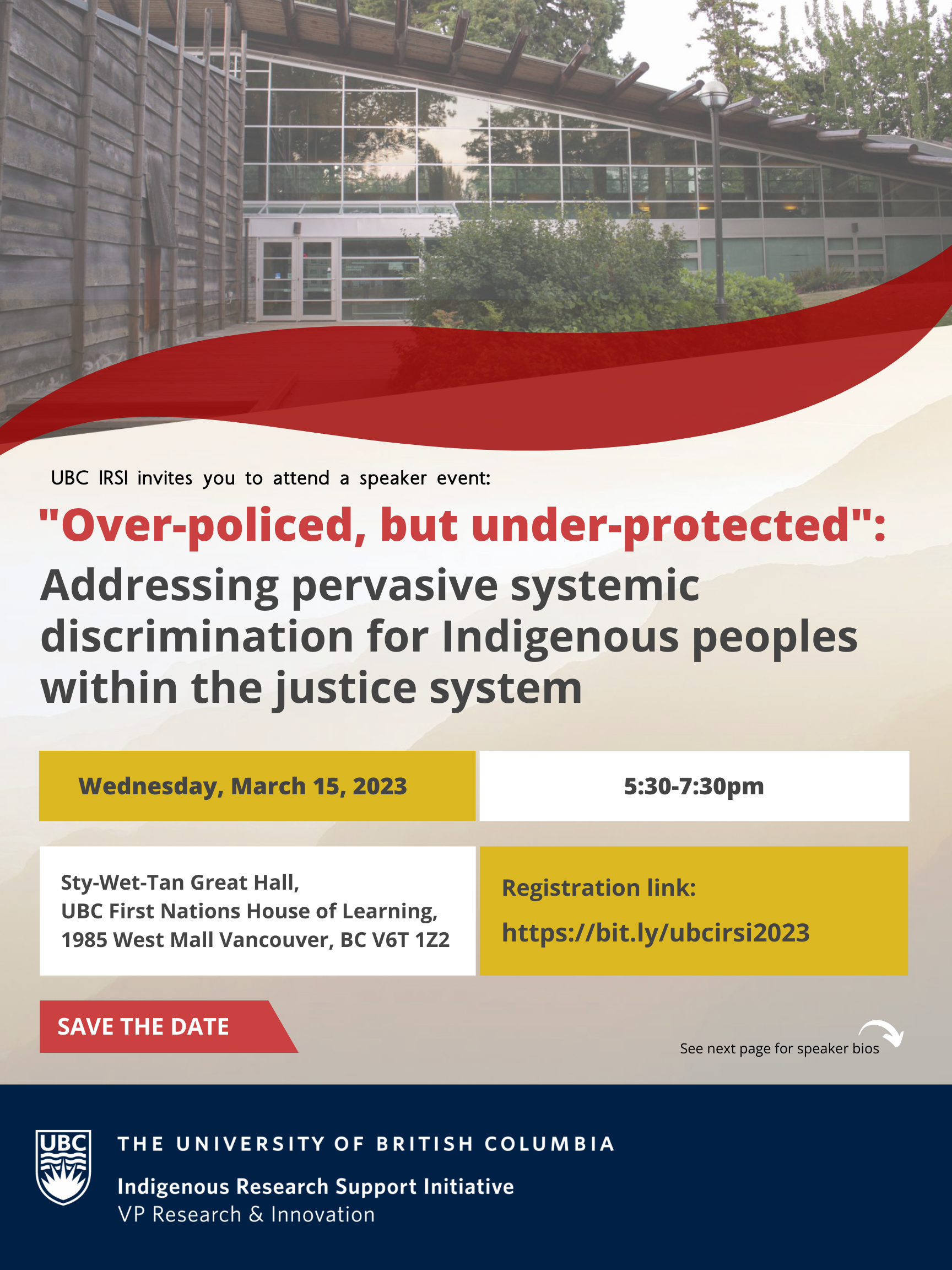
Continue with the second part of our speaker series, “Over-policed, but under-protected". This event is particularly timely as recent data from CBC shows that Indigenous and Black people have more police interactions in B.C.
Featuring a panel of experts Kory Wilson, Boyd Peters, and Rachel Wuttunee, moderated by Patricia M. Barkaskas, this event aims to create a space for shared learning and dialogue on the pervasive systemic discrimination within the justice system for Indigenous peoples across Canada.
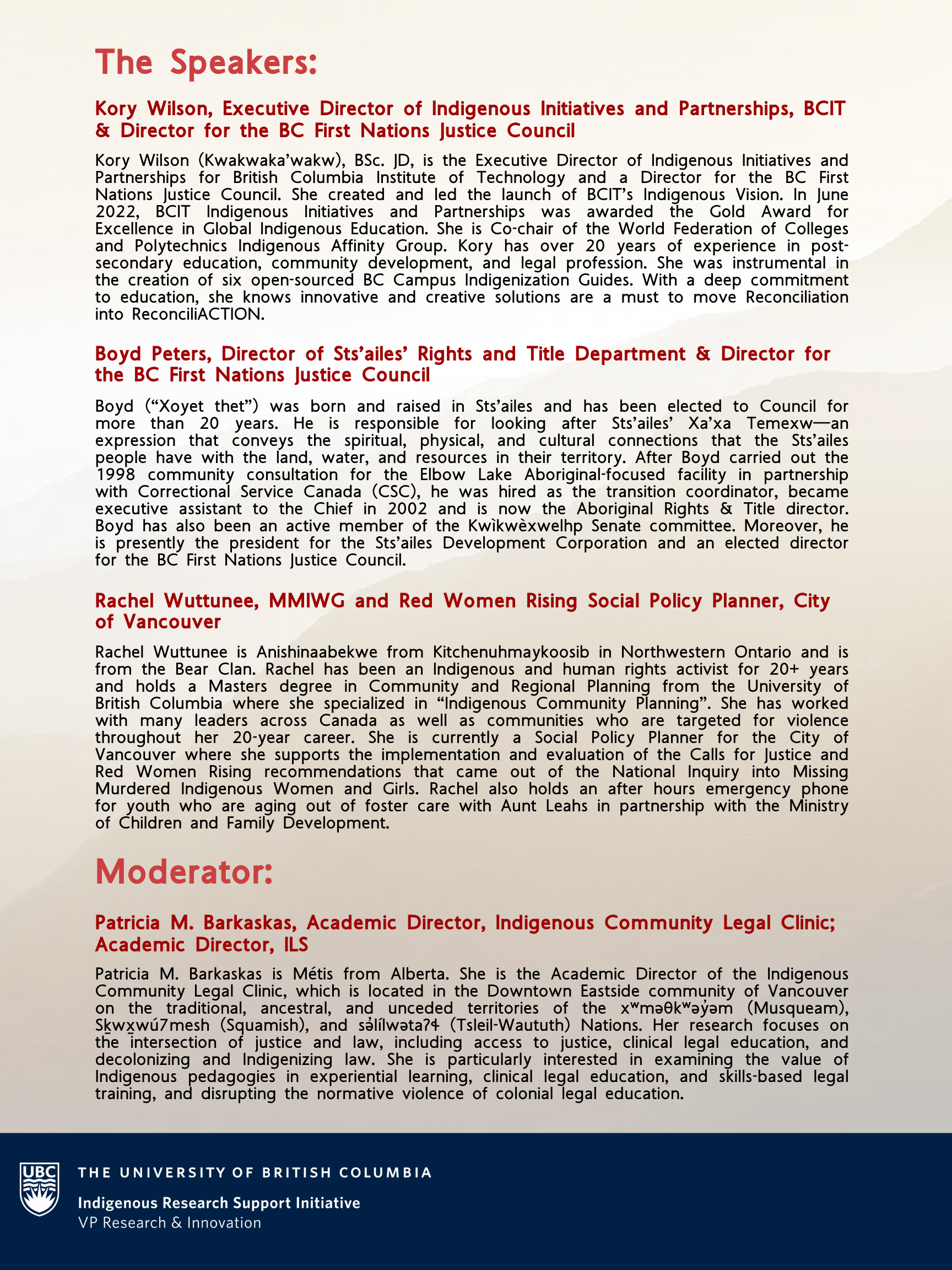
Join us for an engaging dialogue curated by IRSI, with Indigenous community partners from the BC First Nations Justice Council, Allard School of Law and the City of Vancouver.
"Virtual Justice": How Indigneous Courtworkers Supported Clients During COVID and Why It Matters
Esther Armstrong, Shari Olsen, Andrew Thornton, John McCormick, Larissa Rutquist, Handel Wright, and Ngai Pindell
December 6, 2022 | 5:30 PM - 7:00 PM PST
VIRTUAL WEBINAR
Join us on Zoom for this speaker series event on "Virtual Justice": How Indigenous Courtworkers supported clients during COVID and why it matters.
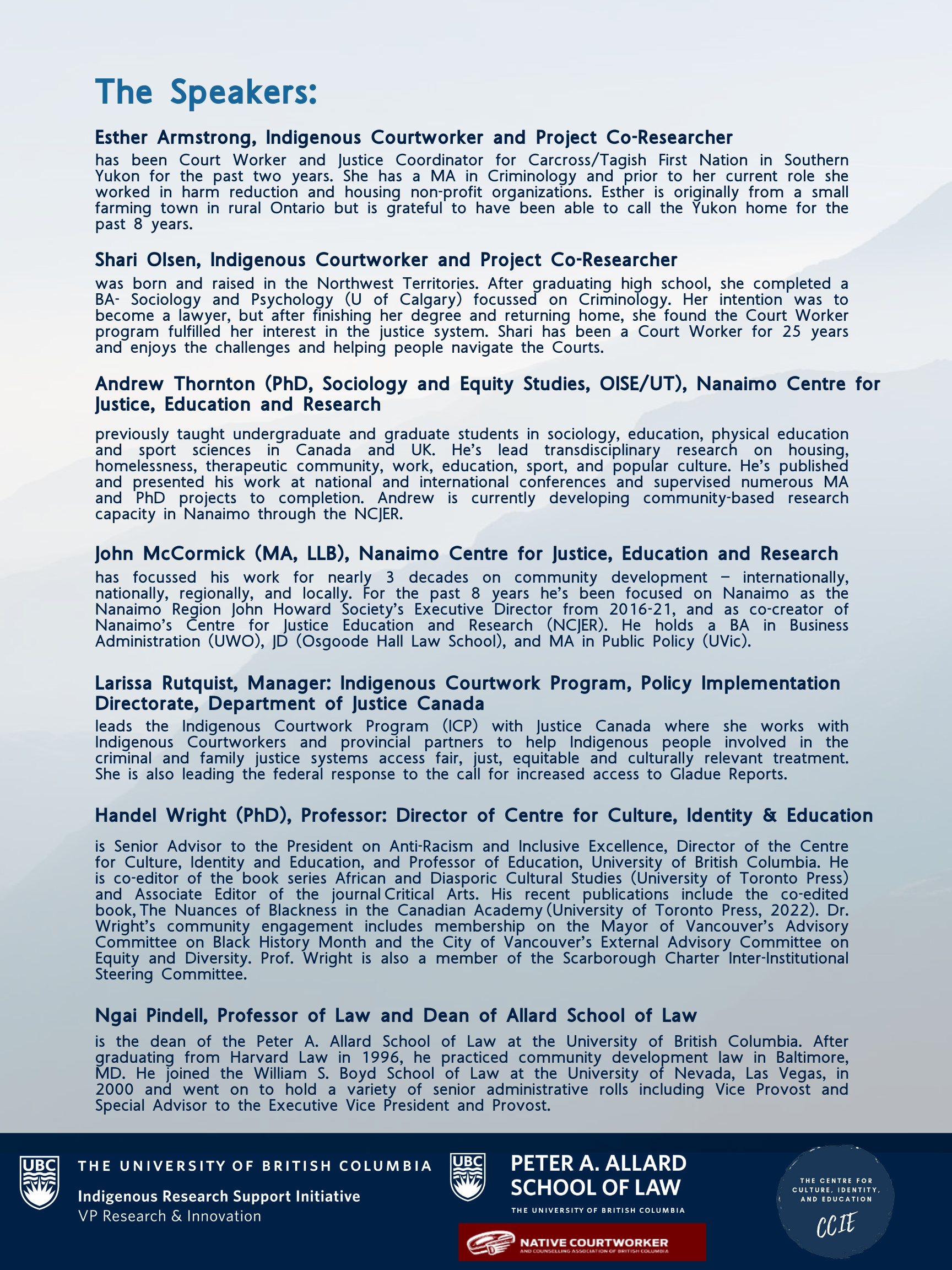
Presented in partnership with the Center for Culture, Identity, and Education, Peter A. Allard School of Law, and the Native Courtworker and Counselling Association of BC.
Pathways to Indigenous Equity: An Indigenous Lens on Health Systems Transformation & Research
Dr. Brittany Bingham and Dr. Lindsay Farrell
Moderated by Leslie Bonshor
April 27, 2021 | 10 AM - 11:30 AM PST
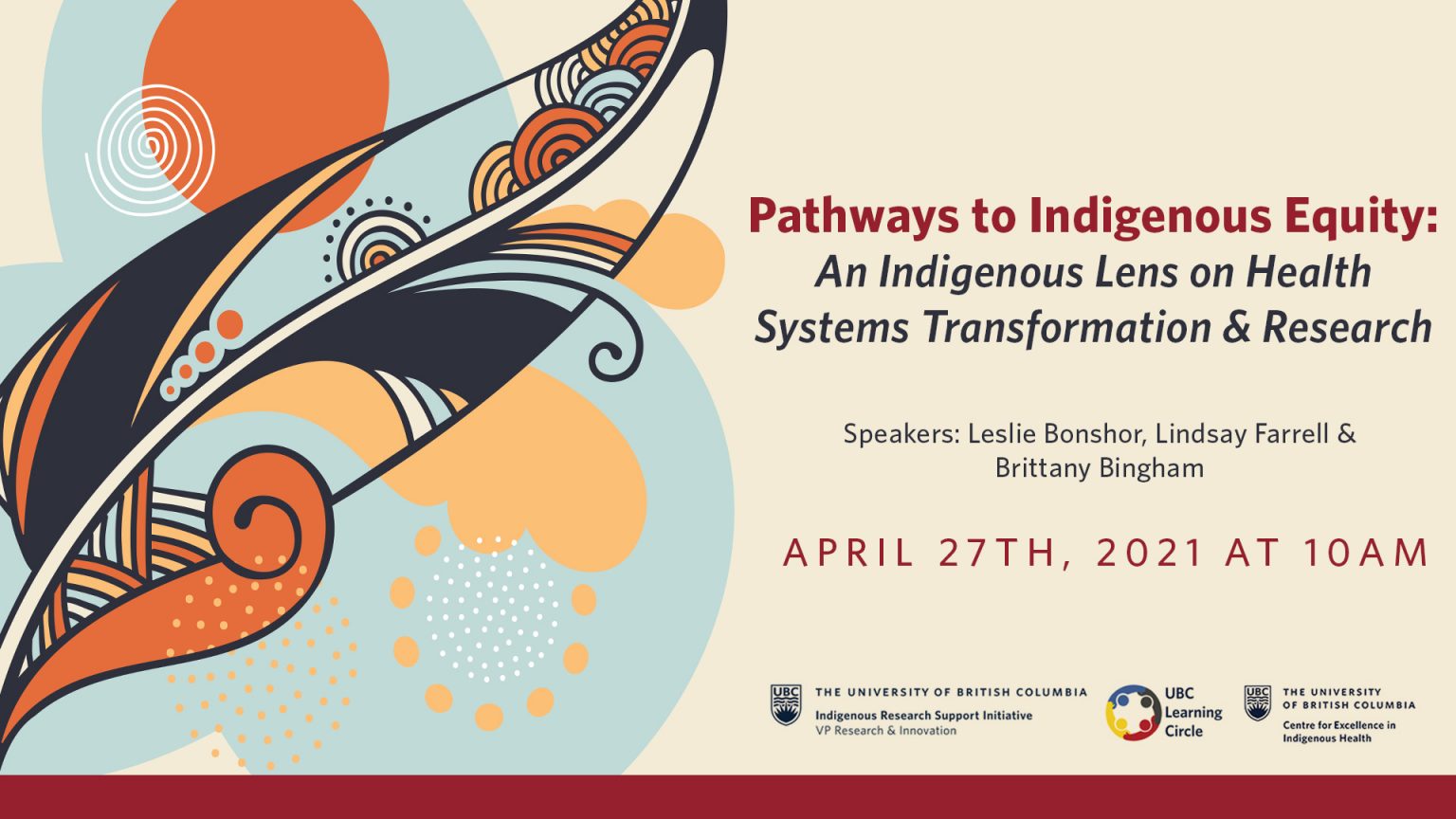
Despite federal and global commitments to addressing and resolving health inequities, Indigenous Peoples in what is presently known as Canada continue to face persistent and pervasive barriers to accessing culturally appropriate care and achieving equity. With its roots in colonialism, the very system intended to support and heal people is failing Indigenous populations; in many instances it is causing harm. The recent review of the health care system in B.C. “In Plain Sight: Systemic Racism in Indigenous Health Care” documented that 84% of Indigenous participants described personal experiences of racism and discrimination that discouraged them from seeking necessary care and that reduced access to care. This talk will explore questions such as, how can we apply a decolonial lens to health research and, in doing so, challenge the systems and structures to transform? And, how can we ensure that systemic change is informed by Indigenous knowledge, voices and tradition? Leslie Bonshor, Brittany Bingham and Lindsay Farrell are all deeply invested in exploring these questions and have dedicated their careers to dismantling colonial approaches to health care and creating health equity for Indigenous Peoples. They will explore ways that collaborative approaches to research can bring about system-wide transformation and ensure Indigenous Peoples’ human right to equitable health care is upheld.
LEARN MORE
Presented in partnership with the Centre for Excellence in Indigenous Health and the UBC Learning Circle
Dada Nentsen Gha Yatastɨg:
Tŝilhqot’in in the Time of COVID
Featuring moderator Mary Ellen Turpel-Lafond/Aki-Kwe;
Presentations by Tŝilhqot’in Chief Joe Alphonse, Crystal Verhaeghe, Emma Feltes, and Dr. Jocelyn Stacey
April 8, 2021 | 10 AM - 11:30 PST
WATCH THE VIDEO HERE

Precisely one year after the BC government declared a State of Emergency in response to the spread of the novel coronavirus (COVID-19), the Tŝilhqot’in National Government has launched a report entitled “Dada Nentsen Gha Yatastɨg: Tŝilhqot’in in the Time of COVID”. Translated to English, the title means “I am going to tell you about a very bad disease.” The report documents how, through the first wave of the pandemic, the Tŝilhqot’in Nation led a coordinated and largely successful pandemic response through the exercise of its laws and jurisdiction. Despite exercising this jurisdiction, however, the Nation faced numerous systemic and institutional constraints when working with government through the pandemic response. This webinar, presented by the researchers who authored the report, will provide insight into Tŝilhqot’in experiences with COVID-19 and discuss some of its recommendations for the Nation moving forward. Panelists will also discuss the unique experiences, lessons learned and research that supports the 40 calls-to-action contained within the report.
LEARN MORE
Presented in partnership with the Centre for Excellence in Indigenous Health and the UBC Learning Circle
In Good Relations:
Ethics and Reciprocity Within Indigenous Research
Dr. Margaret Kovach
March 25, 2021 | 10 AM - 11:30 AM PST
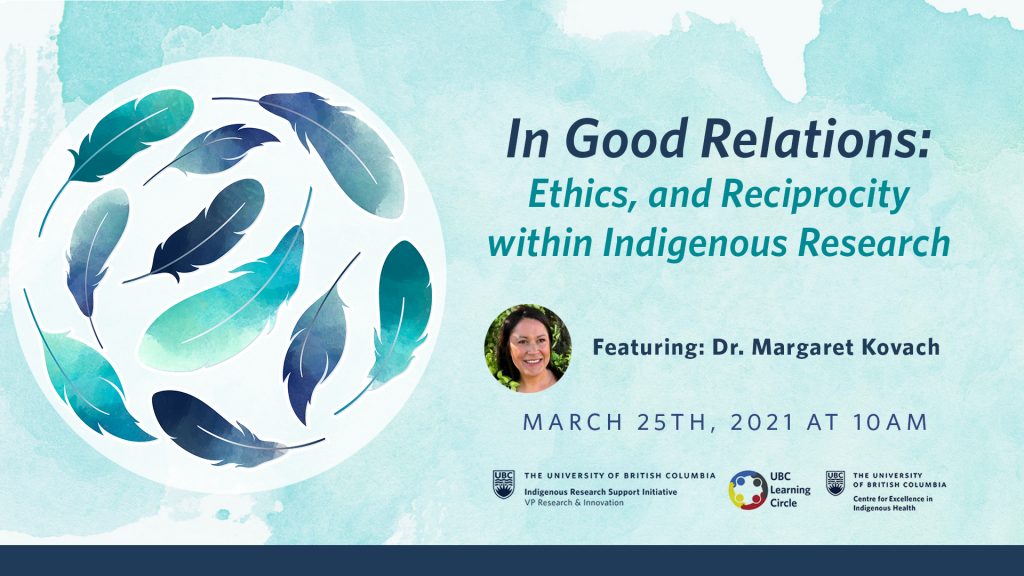
How do scholars and institutions engage in respectful, reciprocal relationships with the Indigenous community? What are the intersections between Indigenous ways of knowing and ethical approaches to collaborative research? How might researchers engender an ethos of ethical engagement when conducting research with Indigenous communities partners? In her talk, Margaret Kovach will unpack the concept of reciprocity as it pertains to doing research that includes, impacts, or pertains to Indigenous peoples.
LEARN MORE
Presented in partnership with the Centre for Excellence in Indigenous Health and the UBC Learning Circle
When the World is Ending...
Strategies and Practices of Care Within
Indigenous Futurist Research and Pedagogies
Roundtable conversation with Dallas Hunt, David Gaertner, and Karyn Recollet
Moderated by Lisa Jackson
February 25, 2021 | 10:00 - 11:30 AM (PST)

In this roundtable discussion moderated by filmmaker Lisa Jackson, panelists Karyn Recollet, Dallas Hunt and Dave Gaertner explored Indigenous futurisms—the projection of Indigenous peoples into imagined futures—within the contexts of the “apocalypse.” Looking specifically toward cultural and political resurgence, they will discuss representations of the apocalypse in Indigenous literature, film, and new media while tracing out the practices of care and compassion that will sustain us in the age of the postapocalyptic.
Presented in partnership with the Centre for Excellence in Indigenous Health and the UBC Learning Circle
INDIGENOUS WORLDVIEWS, CLIMATE CHANGE, AND THE WAY FORWARD FOR NORTHERN TRAPPERS
Dr. Priscilla Settee, with opening words from Dr. Sheryl Lightfoot

LIVE WEBINAR
November 12, 2020 | 10:00 - 11:30 am
WATCH THE VIDEO HERE
Disappearing habitats and shrinking biodiversity are having grave and irreversible consequences for the world’s Indigenous people. Dr. Priscilla Settee has been working with Indigenous trappers in the North to explore the ways that climate change is impacting their livelihoods, food systems and environments. In this talk, Dr. Settee presents the findings of her research, highlighting the immense knowledge and unique worldviews of her Indigenous research partners and bringing forward their broader messages to humanity. She also showcases alternate approaches to climate adaptation posed by Cree and other Indigenous peoples, and explore ways that research and development can support those approaches.
Presented in partnership with the Centre for Excellence in Indigenous Health and the UBC Learning Circle
"OUR EXISTENCES ARE POLITICAL": IDENTITY AND HISTORY AS PATHWAYS FOR TRANSFORMATION
DR. JAMES MAKOKIS AND ANTHONY JOHNSON
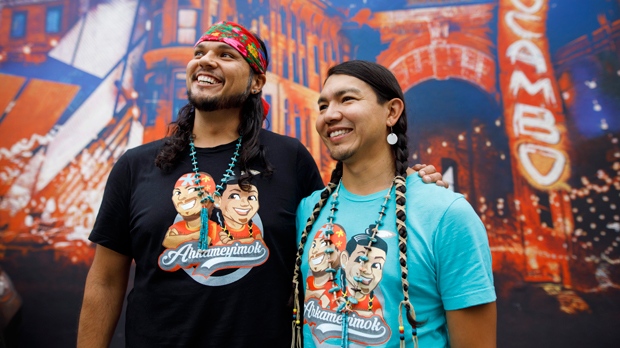
Wednesday, September 23, 2020 | 2:30pm - 4:00pm (PST)
In 2019, Dr. James Makokis and Anthony Johnson became the first two-spirit Indigenous couple to win The Amazing Race Canada. But the real victory for them was raising awareness and shattering stereotypes. The pair used the competition as a platform to tackle topics like gender and sexual identity, racism, mental health and the environment. They did so through an Indigenous lens, naming their team Ahkameyimok, a Cree word that roughly translates to “never give up.”
In this talk, Makokis and Johnson shared their personal transformations, from their early years facing adversity around two-spirit and Indigenous identities to a lifetime of education, transforming them into leaders, activists and role models.
This Free, online LIVE event was moderated by Corrina Sparrow and presented in Partnership with UBC Connects.
Read More
Covering COVID: Pandemic Reporting in Indigenous Contexts
with Candis Callison (moderator), Angela Sterritt and Stephanie Wood
![]()
LIVE WEBINAR
June 4, 2020 | 10 - 11:30 AM
WATCH THE VIDEO HERE
In this provocative webinar, Indigenous journalists Angela Sterritt, Stephanie Wood and Candis Callison (as moderator) will discuss the responsibilities and challenges of covering the COVID-19 pandemic in Indigenous contexts. Panelists will draw on their own experiences, as well as other recent media examples, to discuss the nuanced and complex nature of Indigenous reporting, including its unique ethical considerations. They will share ways that Indigenous reporting, approached with respect, care, and compassion, can lead to safer outcomes for all.
Presented in partnership with the Centre for Excellence in Indigenous Health and the UBC Learning Circle
KITATIPITHITAMAK MITHWAYAWIN: Indigenous-led Planning and Responses to COVID-19 and Other Pandemics - Then, Now, and into the Future
Drs. Myrle Ballard, Stephane McLachlan, and Ramona Neckoway
LIVE WEBINAR
May 26, 2020 | 10 - 11:30 AM
WATCH THE VIDEO HERE
Dr. Stephane McLachlan (University of Manitoba) and Indigenous scholars Dr. Myrle Ballard (University of Manitoba), and Dr. Ramona Neckoway (University College of the North), will discuss their Canadian Institutes of Health Research (CIHR) funded research project exploring ways that an Indigenous-led response can help communities make it through the current pandemic, as well as to prepare for future health crises. Read about their research project HERE.
Presented in partnership with the Centre for Excellence in Indigenous Health and the UBC Learning Circle.
Shelter in the Storm – Housing Security in the time of a Pandemic
with Janice Abbott and Fran Hunt-Jinnouchi
LIVE WEBINAR
May 12, 2020 | 10 - 11:30 AM
WATCH THE VIDEO HERE
Panelists Janice Abbott, CEO of Atira Women's Resource Society and Fran Hunt-Jinnouchi, Executive Director of the Aboriginal Coalition to End Homelessness will discuss the unique risks to the homeless and housing-insecure as posed by COVID-19, as well as some of the innovative ways that their organizations are working to provide safe, secure, affordable and culturally supportive shelter in the time of a pandemic.
Presented in partnership with the Centre for Excellence in Indigenous Health and the UBC Learning Circle.
Brighter Days Ahead: Indigenous Street Gangs and the Impact of Settler Colonialism
with Dr. Robert Henry
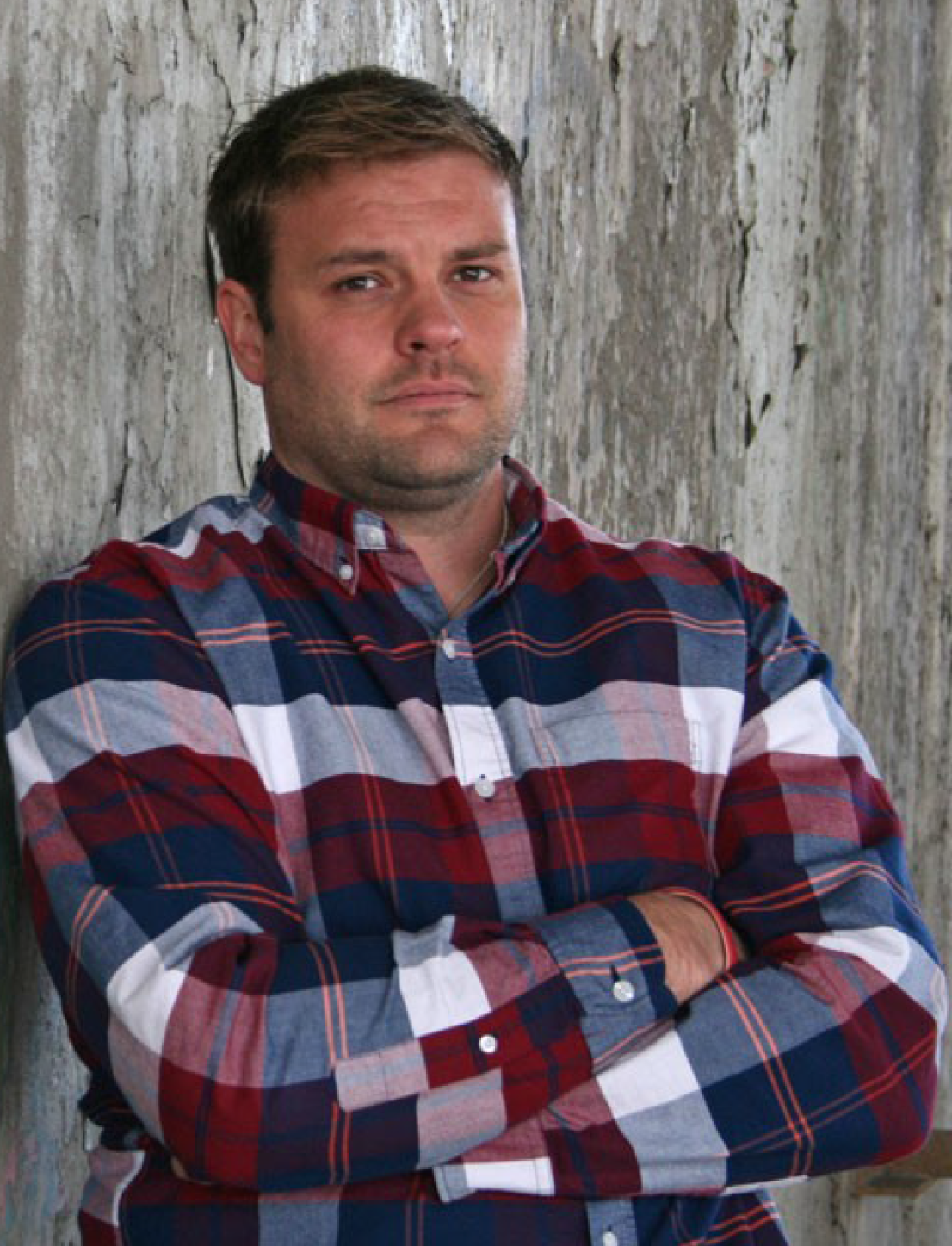
SPEAKER SERIES EVENT
November 18, 2019 | 5:30 - 7:30 PM
READ THE BLOGPOST HERE
Dr. Robert Henry has worked alongside Indigenous street youth and gang members across the Prairie Provinces for more than a decade. His collaborative photo-voice research method allows participants to take photographs of what’s important to them, effectively telling their own stories, in their own ways. The resulting visual narratives that emerge are intimate and moving, often showing lesser-told stories of hope and resilience, complexity and challenge, that define these marginalized communities.
Robert Henry, Ph.D., is Métis from Prince Albert, SK and is an Assistant Professor at the University of Saskatchewan, in the Department of Indigenous Studies.
Free, Prior and Informed Consent: Concept, Practice, Promise and Perils
with Merle Alexander
SPEAKER SERIES EVENT
October 25, 2019 | 12:00 - 1:00 PM
WATCH THE VIDEO HERE
Merle Alexander will discuss Free Prior and Informed Consent (“FPIC”) at our next Speaker Series event on October 25th, 12:30-2:00pm. Merle Alexander is an UN negotiator for Indigenous Peoples; legal advisor on modern day treaties between First Nations and the Crown; negotiator of Industry-Indigenous resource agreements, traditional knowledge protocols; advisor to Indigenous communities seeking to develop protective and conservation measures to protect their indigenous legal orders.
Weaving our History: Education Through a Musqueam Lens
with Debra Sparrow
SPEAKER SERIES EVENT
September 17, 2019 | 12:30 - 2:00 PM
READ THE BLOGPOST HERE
When she was in eighth grade, Debra Sparrow left school and never returned. Today, she is an acclaimed weaver and visual artist whose works are displayed in museums and galleries around the world. And while Debra is perhaps best known for her weaving, she has created in media from graphic arts to painted drums, jewelry to murals. A knowledge-keeper for Musqueam culture, Debra also speaks eloquently and passionately about the importance of education, and more specifically, the education that exists outside of academic institutions and within her traditional teachings and artforms. In this sure-to-be engaging conversation Debra shares her complex and sophisticated views on education and showcases the teachings woven into her craft.
